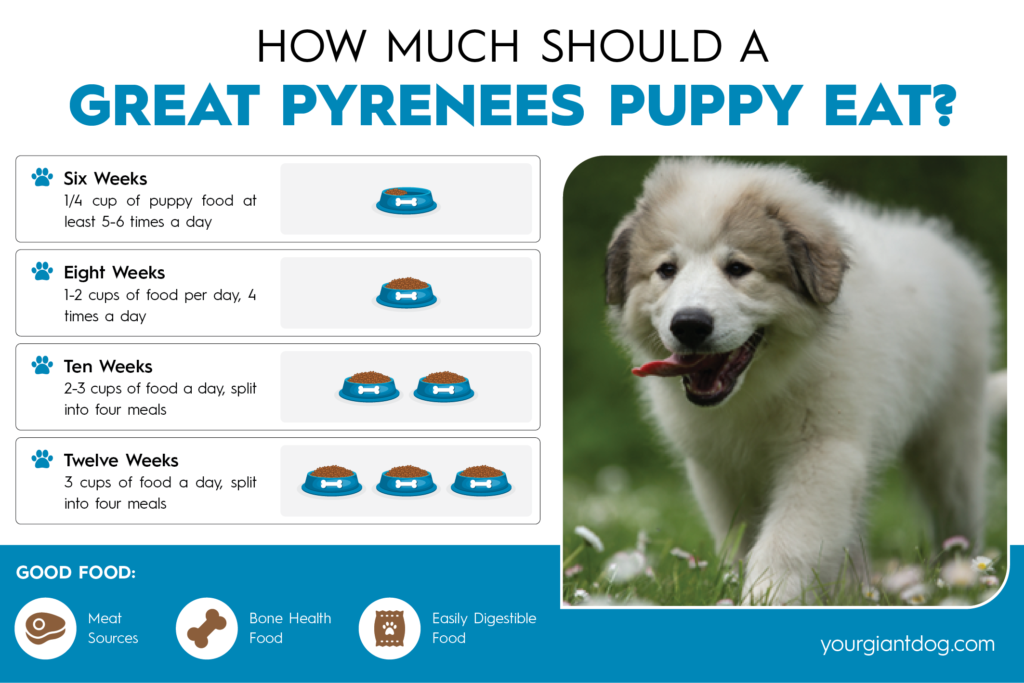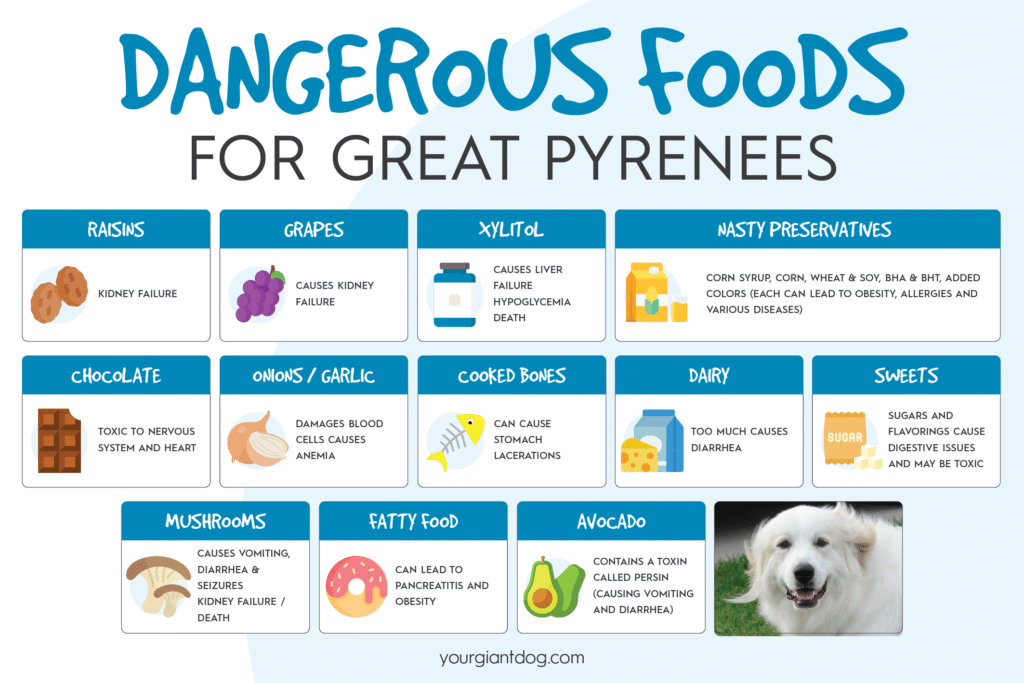The Great Pyrenees has dietary needs that must be met, or it can affect their weight levels and overall health. If you own this breed, you should be mindful of their eating habits and know how much the Great Pyrenees puppy can eat.
You should start feeding your Great Pyrenees puppy one and a half to two cups of high-quality dry food or kibble when they are eight weeks old. This increases to three cups per day when they are twelve weeks old. If your puppy is highly active or underweight, you can increase the amount of food.
Apart from the quantity of food to feed your puppy, we cover other important elements, such as the type of food to feed them and the various health benefits and issues to be aware of.
What Should I Feed My Great Pyrenees Puppy?
When looking at dietary requirements, should the Great Pyrenees puppy eat certain foods? We cover these below:
1. Meat Sources
You will find the best meat sources for your Great Pyrenees puppy in wet food or kibble. The best meat sources include turkey, chicken, wild game, fish, lamb, etc.
These solid food sources are recommended because the daily protein intake of a Great Pyrenees puppy must be at least 22% of the food consumed.
2. Bone Health Food
Great Pyrenees are prone to hip dysplasia. They should therefore be provided with the best moist food for their bones. This includes foods with glucosamine, vitamin D, calcium, and phosphorus.
Most puppy foods designed for large dogs will contain these essential vitamins and minerals.
Including these food sources in their diet will help keep their bones healthy and strong for a long time.
3. Foods That Digest Easy
Another health issue the Great Pyrenees is prone to is bloat. That is why the food they consume must be easy to digest. This is especially important if your puppy has a habit of eating a lot of food each day.
So, the kibble size is an important factor for you to consider. You should be able to tell if your dog is comfortable eating its kibble or if it’s having a hard time chewing.
As long as you are purchasing kibble for large dogs from quality brands, there shouldn’t be an issue here.

How Much Should I Feed My Great Pyrenees Puppy?
The amount of food your Great Pyrenees should eat depends on many factors. However, the most important is the age and size of your Great Pyrenees puppy. Here is your guide to understanding how much to feed your Great Pyrenees according to their age:
- Six Weeks: A quarter cup of puppy food at least five to six times a day
- Eight Weeks: One to two cups of food in a day, which must be split into four meals
- Ten Weeks: Two to three cups in a day
- Twelve Weeks: Three cups a day split into four meals
These are the general estimates only; you should monitor this closely and increase the quantity if your puppy is underweight or highly active.
Why Do Great Pyrenees Puppies Need High-Quality Protein and Fat in Their Diet?

Bone health and growth is one of the most important factors for the Great Pyrenees, as poor bone health can lead to many health issues for this giant breed.
That is why high-quality protein and fat are important aspects of their diet. For example, their diet needs 22% protein and 8% fat content to maintain optimal health.
These nutrients reduce the chances of the puppy developing any orthopedic diseases they are prone to, such as Patella Luxation and Hip Dysplasia.
Should I Feed My Great Pyrenees Puppy Treats?
Puppy treats are an important aspect of training your dog; however, they should only be given in moderation.
It’s not uncommon to see many puppy treats with additional fillers and preservatives added in. These should be avoided as they provide minimal nutritional benefits and cause potential health issues.
Always read the labels on dog treats before purchasing. They need to be nutritious and of high quality.
Another thing you must keep in mind is the number of treats you feed.
A Great Pyrenees puppy can eat doggie treats, but they should be no more than 10% of their overall food intake.
Many owners tend to go overboard in this area. It can lead to weight gain and unnecessary health concerns in the long run.
When Should I Feed My Great Pyrenees Puppy?
You might be wondering how often should a Great Pyrenees puppy eat.
We recommend feeding them initially four times a day. The meals must be spaced in an appropriate manner so it offers them the best eating routine for optimal digestion.
You can feed your Great Pyrenees puppy at 7 am, 12 pm, and 3 pm, and the last meal at 6 pm.
These are the ideal times and will create a consistent routine. You can also create an exercise plan around these times to help your puppy stay active and energetic.
Refrain from offering too many treats after the last meal to help minimize any issues with their sleep at the end of the day.
Is It Fine for My Great Pyrenees Puppy to Skip One meal Every Day?
Puppies and dogs love food and can’t get enough of it. However, you shouldn’t be alarmed if your Great Pyrenees puppy skips one meal a day on occasion. This is typical for many breeds to do this every now and then.
Of course, you should be alarmed if your puppy goes without eating for an extended period.
Anything greater than 24 hours is a concern, and you should call your vet and inform them of the situation if that happens.
What Are the Signs of Hunger with Great Pyrenees Puppies?
It is easy to spot a hungry puppy through its behavior. A Great Pyrenees puppy will be upset when they are hungry, and it might start eating or chewing things not meant for them.
This is a typical symptom of hunger tension, which is why keeping a consistent feeding routine is important.
If you notice this type of behavior, be mindful of when they last ate and top up their food bowl if you feel it is necessary.
What Are the Signs of Overfeeding?
Understanding the various signs of overfeeding in your Great Pyrenees puppy is crucial. An overweight puppy can start developing various health problems, so we want to avoid this at all costs.
Here are the top signs you are overfeeding your Great Pyrenees puppy:
1. Weight Gain
An expanded waist and belly should be very noticeable, and they will feel heavier than before. Check your Great Pyrenees puppy on a regular basis to ensure you are not overfeeding them.
2. More Lethargic
This breed is typically energetic and active and loves going outdoors to explore and play.
As active mountain dogs, they don’t like sitting for extended periods.
“A common sign that you are overfeeding your Great Pyrenees is that it will become lethargic. The puppy will not have the energy to do anything and will lie around most of the time.”
Lethargy in your puppy could be a sign of overeating and being overweight. This should become evident very quickly, especially if their energy levels start declining.
3. Bowel Movements
A common symptom of overfeeding is a change in the bowel movement of your Great Pyrenees. For example, it will be normal in the morning, and as the day progresses, it will become softer.
That is one of the easiest ways to determine that you are overfeeding your puppy.
Symptoms may vary, of course, depending on how much activity your dog is getting, the type of food they are eating, and much more.
What Are the Best Foods for My Great Pyrenees Pup’s Diet?

Meat products are one of the best foods your Great Pyrenees puppy can eat, mainly due to their protein content.
Fulfilling their daily protein intake is important for their health. Do this by feeding them foods such as poultry, fish, wild game, lamb, and much more.
Other important minerals and vitamins are also crucial for their development. You can include these in the form of supplements, such as ARA, DHA, EPA, and others.
On the other hand, there are several foods to avoid as much as possible. These include food filled with fillers, gluten, corn, etc.
These ingredients are unhealthy and will expose the Great Pyrenees to many health and weight-related issues.
When choosing a dog food brand, always check the ingredients. The fewer fillers, additives, and chemicals there are, the better it is for your dog’s health.
When To Switch Great Pyrenees from Puppy Food?
It takes around two years for the Great Pyrenees to reach their adult size. Once this occurs, it’s a good time to switch from puppy food to adult varieties.
This also includes supplements and other growth food that you may have been feeding them as a puppy.
When To Consult Your Veterinarian Regarding Your Puppy’s Diet?
Having a veterinarian close by is crucial, as you have peace of mind knowing you can always contact them in case of any emergencies.
If you find your puppy’s diet is not supporting their growth and you are noticing signs and symptoms that concern you, it is best to contact your vet for advice.
This includes symptoms such as vomiting, diarrhea, irregular bowel movements, weight loss or gain, etc.
You should first try changing their diet, and if this fails to make a difference, you should consult your vet as outlined.
What Foods Are Dangerous for the Great Pyrenees?
There are several foods that are highly dangerous to this breed, and even fatal. See the below guide, which showcases the various food groups to steer clear of:

Final thoughts
Keeping the diet right for your Great Pyrenees puppy can be challenging, especially if you are a new pup parent. We hope this blog post has given you a better understanding of the best nutrition for these puppies.
By following these guidelines, you should be better equipped to respond to any signs or symptoms of health issues as they arise.

